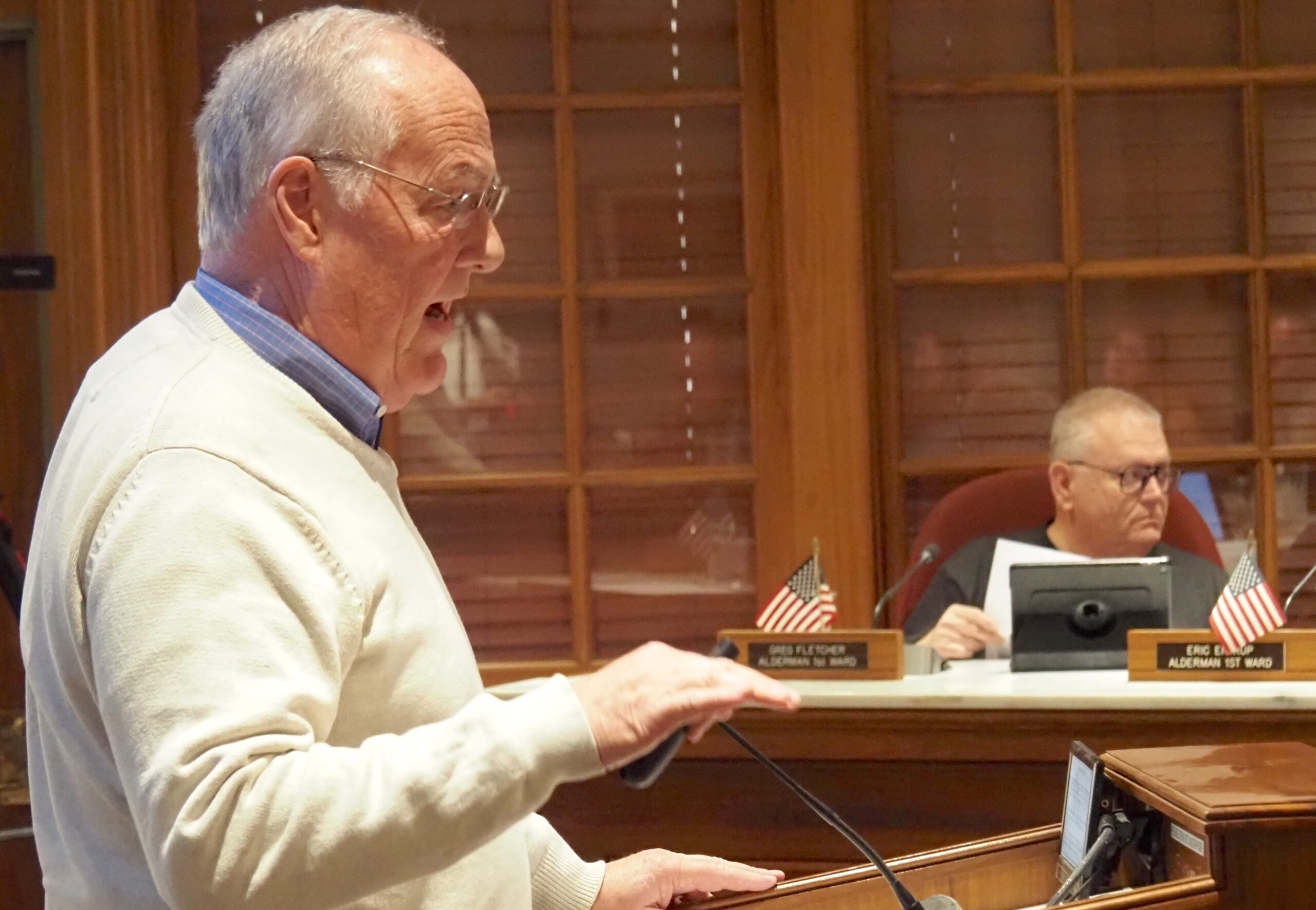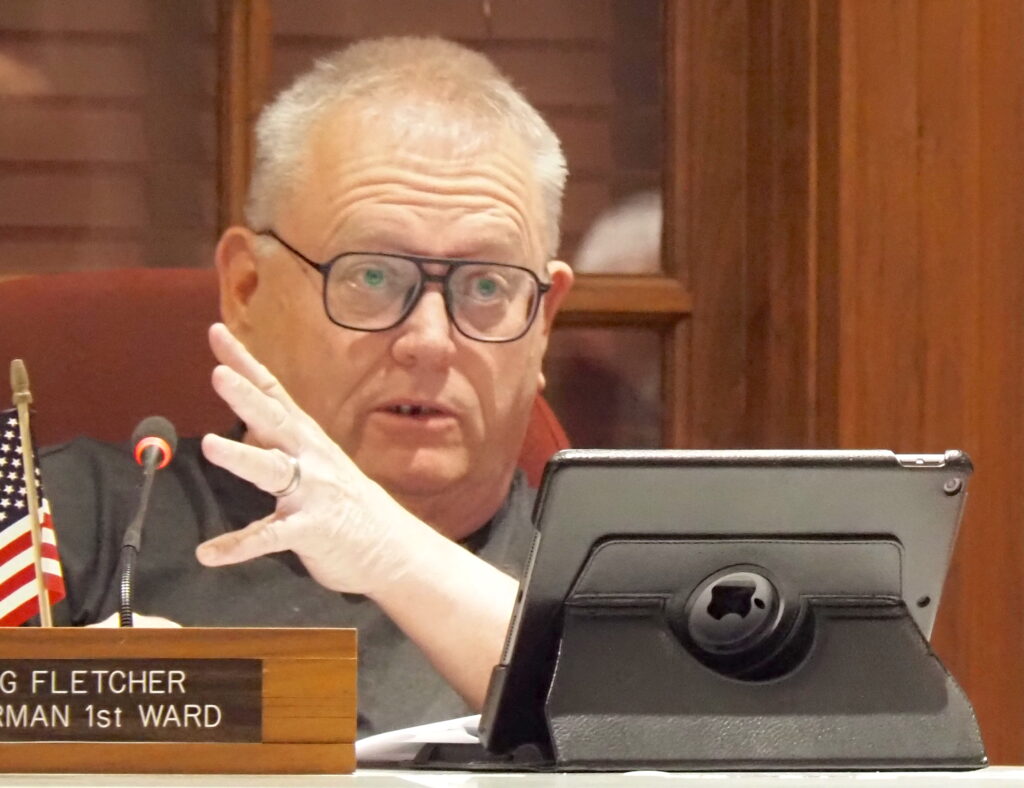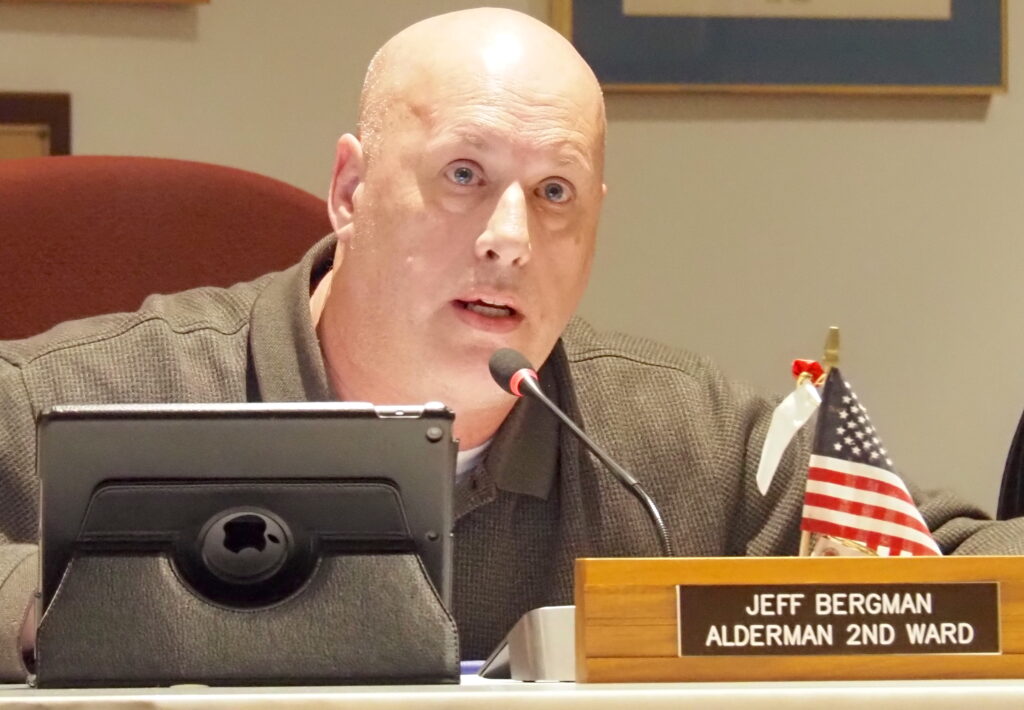City Council hears presentation, Q&A about local grocery tax; audio problems during streaming frustrate Bergman

QUINCY — Director of Administrative Services Jeff Mays spent about 20 minutes during Tuesday’s Quincy City Council meeting making a presentation and taking questions from aldermen about a proposed 1 percent municipal grocery tax that will replace a state tax that will sunset on Jan. 1, 2026.
A third reading and a vote on the tax is on the agenda for the Feb. 24 meeting, but one alderman tipped his hand Tuesday on how he plans to vote.
“A lot of people don’t realize that this city is ran off sales tax receipts,” Alderman Greg Fletcher (R-1) said. “Not property taxes. Sales tax receipts. And if you keep knocking that down, then the budget is going to have to go down with it. Now, some will say we spend too much money. I’ve heard the phrase ‘like drunken sailors.’ Maybe that’s true. Maybe it ain’t. There’s always waste in government. As you read in the news, there’s a lot of it.
“I think we need to continue this. Not for the reason of raking in a bunch of money to raise the taxes, but people expect to have their trash picked up. They expect to have a policeman two or three minutes away and a fireman two or three minutes away. I mean, people want it, and it costs money.”
The state no longer will collect a 1 percent tax on groceries that it has collected since 1981, but each taxing authority statewide can enact an ordinance to collect that 1 percent tax itself. Quincy’s total sales tax is 8 percent, and it will remain at 8 percent if the local ordinance is created.
Mays said Illinois Municipal League (IML) projections show the city will lose $1.1 million in sales tax revenue if the city doesn’t pass the local tax — and he believes that figure is low.
“In the general merchandise category (one of 10 tax categories collected for sales tax), you have Walmart, and you have Target,” Mays said. “If you go to Walmart’s website, you’ll find that basically 60 percent of the sales from a Walmart are grocery now. Whether they’re all classified that way for state purposes, I can’t tell you. When we approximated a $1.1 million figure for this, you just need to know that’s the best we could do given the methodology that the IML provided to all of the communities in the state.

“Similarly, you have Casey’s and Ayerco and a bunch of other community convenience stores in the automotive section (another tax category). What happens with their grocery sales? Do those get lumped into the food category or do they not? I want you to know that the $1.1 million is the best guess that we’ve got as to what the impact is on our revenues in the coming year.”
The city’s municipal sales tax collection has gone from $9,653,876 in 2016 to $12,681,310 in 2023 — a 31.4 percent increase. Mays said about 40 percent of the city’s sales tax is generated by people who don’t live in Quincy, and municipal sales tax makes up 25 percent of the city’s General Fund revenue.
“I’ve had some people reach out to me, and some of them are thinking that this is a new tax on top of an old tax,” Fletcher said. “Obviously that is not correct. This tax has been in force since 1981, and the state’s collected it. They took their little slice of the pie, kind of like the mafia, and the state has sent us back the rest. So what we’re going to be doing here is keeping all of it — nothing going up, nothing going down. It’s just a continuation (of the grocery tax), and then that goes 100 percent in the general fund.
“If we don’t do this, I mean, what’s our city going to look like? We’re going to be laying off policemen and firemen. We’re going to be laying off social service workers. We don’t want to go down that road, but people are tired of new taxes. So we need to make sure people understand this is not a new tax.”
Near the end of Tuesday’s meeting, Jeff Bergman (R-2) asked Mark Dumanowsky, information technology director for the city, about issues with audio on the Facebook live streaming service.
“Why is there no volume? And again, why is this a constant problem?” Bergman asked.

“We think some of our equipment may have gotten compromised by some of the construction going on in the building, but we’re actually trying to troubleshoot the audio issue right now,” Dumanowsky said. “We were able to get our Facebook up and running, but the audio issue is still being worked on. Don’t really have an answer for you, but I can get back to you once we get a result.”
“Doesn’t do me any good. What about the citizens at home?” Bergman said. “I mean, I’m getting tired of this. It’s just constant. We’ve been fighting this audio and video for years. If it’s not this system, it’s … a previous system. This new system was supposed to hopefully fix everything.”
“Well, we’re looking at the infrastructure and our cabling because of all the construction that we’ve had going on,” Dumanowsky replied. “We think that something has been compromised as a result of that, but we’re working to try to get it fixed.”
“Is there any way to test this before the meeting starts at 7 (p.m.) to make sure it’s OK on TV?” Bergman asked.
Dumanowsky said he and his staff arrive about 30 minutes before a meeting to “validate” all of the controls and connectivity.
“Until we get the actual meeting going and get the equipment started to do the live streaming and Facebook, we don’t anticipate issues,” he said.
“So there’s no way to be proactive and make sure this is going to work?” Bergman asked.
“To some extent, we try to be proactive,” Dumanowsky said.
“Again, that’s not the answer,” Bergman said. “I asked the question: Is there any way to be proactive to ensure that this is or is not going to work? Or do we have to wait until we go live for the television?”
“No, we’re going to do our best to be proactive,” Dumanowsky said.
“You still didn’t answer my question,” Bergman said.
Bergman and Dumanowsky went back and forth for a while, with Dumanowsky saying, “I wasn’t anticipating any issues, but once we identified the issues, we started working on it.”
Bergman then angrily demanded Dumanowsky fix the issue.
“I’m sick and tired of it. Sick and tired of it,” he said. “The citizens at home, the taxpayers, deserve a lot better than this, as far as transparency and being able to listen and watch the meetings. Sick and tired.
“So next week, I hope to God that you guys test this or you’re able to look at it before the meeting starts. Because if there’s a problem, hopefully you can rectify it before the meeting starts or at least be aware of it. You’re not even aware of it (until) we say something. Frustrating. This is really piss poor service for the residents at home, for the taxpayers. I’m sick and tired of it, so we need to get it fixed.”
Miss Clipping Out Stories to Save for Later?
Click the Purchase Story button below to order a print of this story. We will print it for you on matte photo paper to keep forever.

